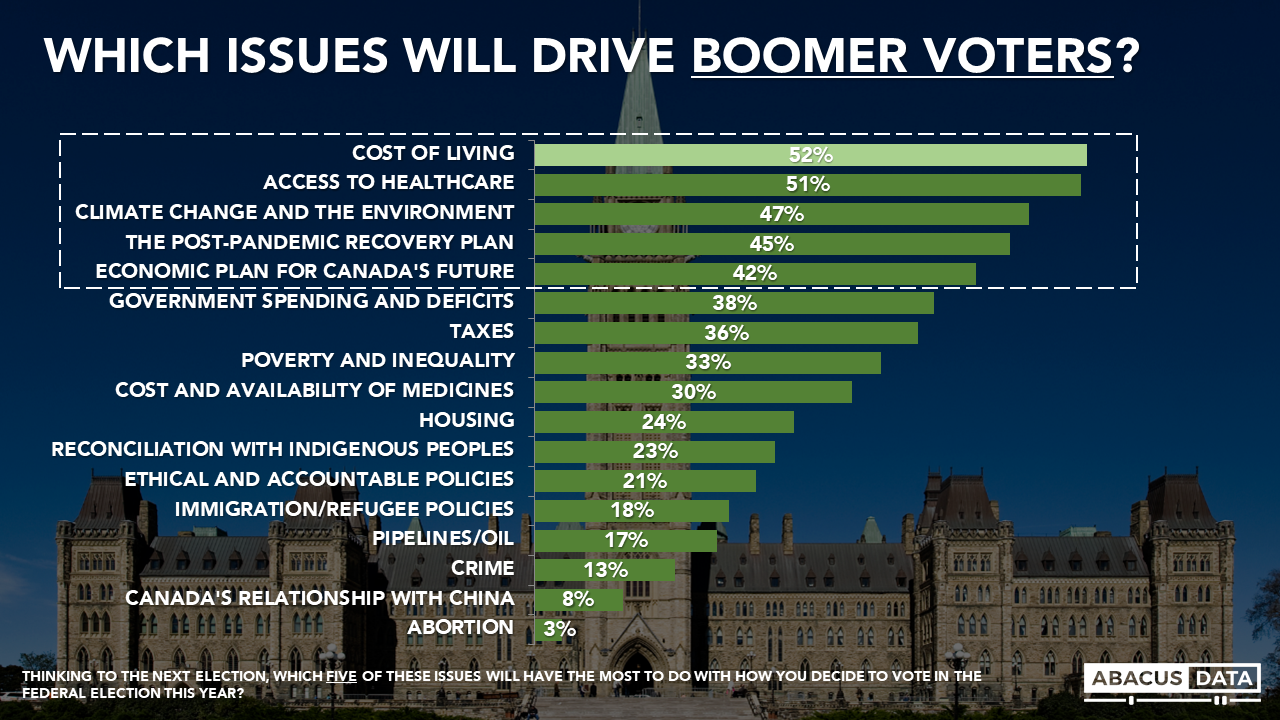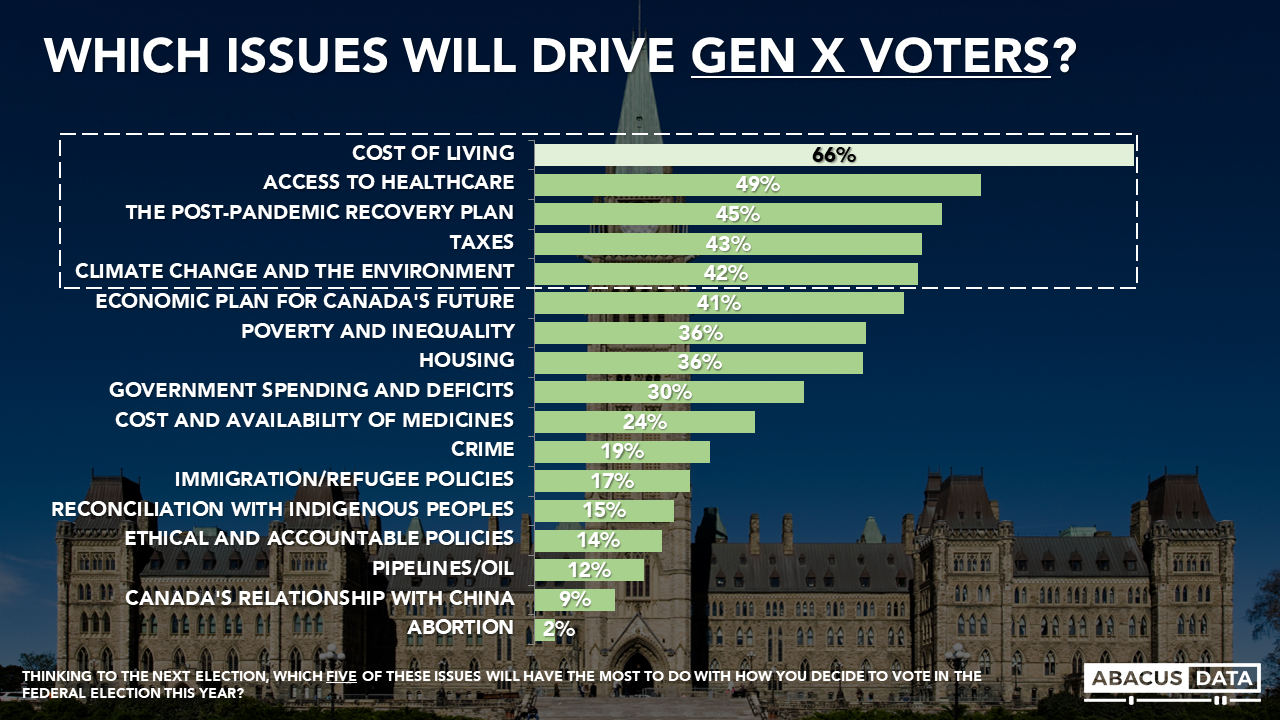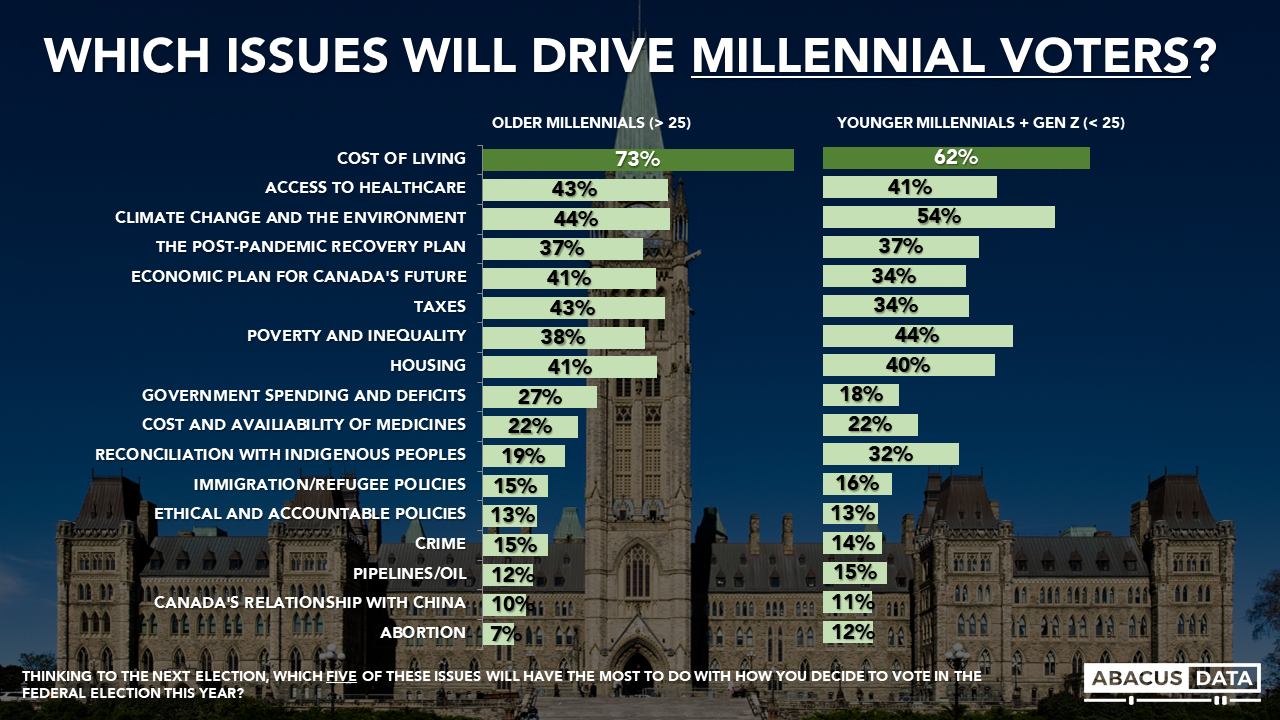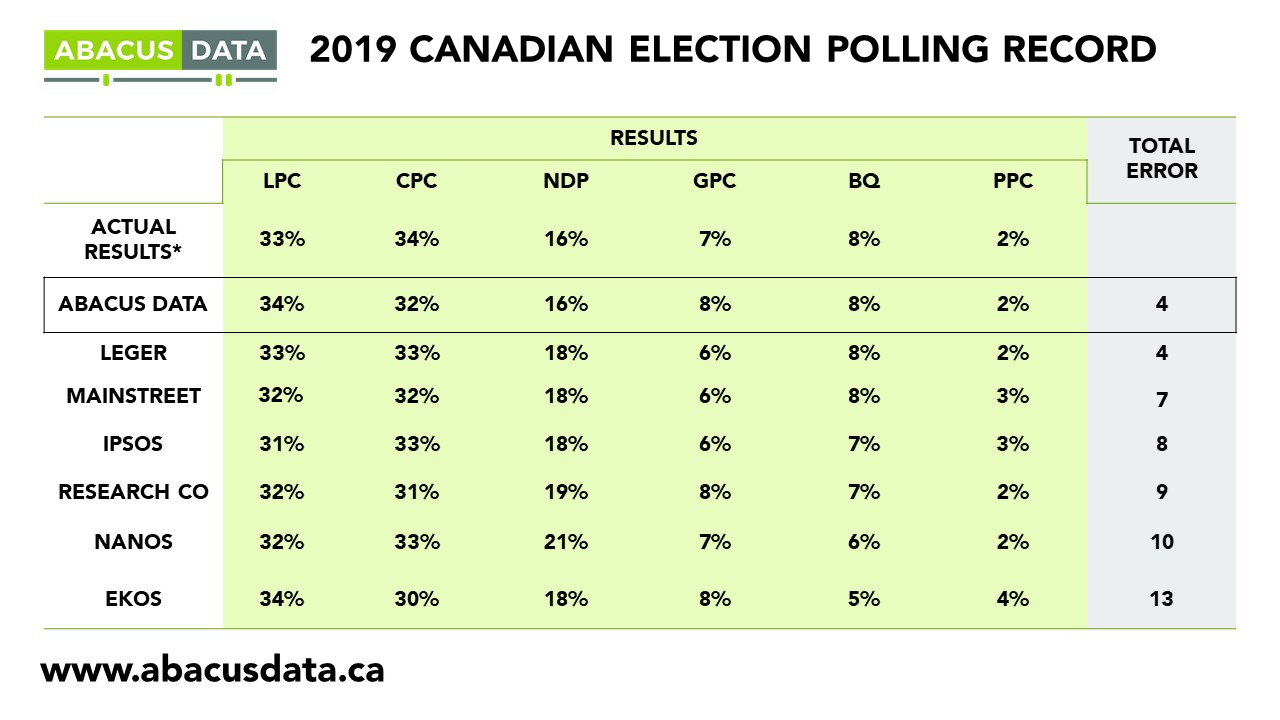Abacus Election Bulletin: Cost of living important for all generations, especially millennials
August 19, 2021
Each day during the 2021 Federal Election campaign, researchers at Abacus Data will share insights and analysis from our polling in concise, insights-focused reports. To never miss our polls and analysis, subscribe to our newsletter.
Prior to the pandemic, and even before, the political environment has been ripe for affordability to not only dominate a federal election, but drive sharp generational divides. As just one example, when baby boomers were young adults it took them an average of 5 years of full-time work to save for a 20% down payment, compared to today where it will take young adults 14 years of full-time work. As the election kicks off the data from our pre-election survey is no different.
To start, cost of living makes an appearance in almost every generations list of top five issues.

The silent generation is the only one to have cost of living fall below their top 5 issues. Those in this older generation are prioritizing issues like climate change, access to healthcare, and plans for the future. While no party seems to be catering to this generation specifically, the issues the parties have focused on so far are more or less the top issues for these individuals.
Next up is the baby boomer generation, the top issues look fairly similar though cost of living has been shuffled to the top of the list, and by a large margin.

For boomers, cost of living, healthcare, climate change and the environment, and recovery plans are in the top 5 issues. Percentages aside, their top 5 list mirrors that of the average Canadian.
For Gen X voters, the list looks fairly similar, but cost of living continues to grow in importance.

Two thirds of Gen X voters place cost of living in their top 5 issues, and it has a sizable lead over any other issues in their top 5. Gen X (those 56 to 41 years old) likely have very different cost of living worries than millennials: think supporting children vs. purchasing a first home. Still, the importance of cost of living for this demographic is a reminder of how important cost of living is in this election.
Finally, millennials. Cost of living tops their list, and by an even greater margin. Among this generation, there is a 25-point gap between cost of living and the second most important issue, suggesting this is both a very important issue for this generation, but also the uniting issue across the generation.

Millennials may be the largest voting bloc but they are also the generation that spans the widest array of life stages. Some millennials are nearing 40, onto their second homes, have kids that are nearly teenagers, and are carrying all the costs associated with all these life events. Others are unemployed new grads with student loans, staring down a volatile housing market, but currently have less financial pressures on them when it comes to their own expenses and perhaps more optimism about the future.
Looking at the data these priorities are reflected fairly well. Cost of living is still a top issue for both older and younger millennials (and Gen Z), but younger millennials and Gen Z are in fact placing more importance on the social issues we might expect younger people to be passionate about.
On social issues we see some pretty significant differences on climate change & the environment, poverty and inequality, and reconciliation with indigenous peoples (all are more important for younger millennials + Gen Z). And on the other end, older millennials are more concerned with taxes, and government spending.

Still, what unites this generation and sets it apart from others is cost of living. Millennials as a whole are almost entirely aligned with boomers on social issues like climate change & the environment and indigenous reconciliation, and even on housing (only 1 or 2 points different). But with cost of living, there is a 19-point gap between the percentage of boomers that placed this as a top 5 issue, and the percentage of millennials.
THE UPSHOT According to Oksana Kishchuk: The millennials that helped secure the Liberal win in 2015 have grown up. For older millennials they’ve had six more years to pay taxes, watch government spending and compare it to their own life expenses, and attempt to secure a starter home that will help catapult them through the housing market instead of set them back.
And for younger millennials (and Gen Z) they’ve evaluated progress on climate change commitments, read the news about unmarked graves from residential schools and seen inequality in Canada rise from pandemic impacts.
The Trudeau Liberals are once again attempting to capture these two sides of the young voter – trying to position themselves as the party fighting for the middle class to quell affordability concerns and the party fighting for social issues, namely climate change. But two weeks, never mind six years, can change things in politics.
Our latest numbers show the NDP, who are focusing heavily on the millennial vote by promising social policies to address affordability, have a slight lead over the Liberals among young voters.
And the Conservatives, despite low polling numbers among young voters, could capture these voters using their fiscal solutions for addressing affordability and cost of living.
As parties continue to roll out their messaging and platforms on Canadians top issues we will continue to monitor the moods of each generation, and how they feel throughout the campaign.
METHODOLOGY
The survey was conducted with 3,000 Canadian adults from August 6 to 11, 2021. A random sample of panelists were invited to complete the survey from a set of partner panels based on the Lucid exchange platform. These partners are typically double opt-in survey panels, blended to manage out potential skews in the data from a single source.
The margin of error for a comparable probability-based random sample of the same size is +/- 1.8%, 19 times out of 20.
The data were weighted according to census data to ensure that the sample matched Canada’s population according to age, gender, educational attainment, and region. Totals may not add up to 100 due to rounding.
Abacus Data follows the CRIC Public Opinion Research Standards and Disclosure Requirements that can be found here: https://
ABOUT ABACUS DATA
We are the only research and strategy firm that helps organizations respond to the disruptive risks and opportunities in a world where demographics and technology are changing more quickly than ever.
Find out more about what we are doing to help clients respond to the COVID-19 pandemic.
We are an innovative, fast-growing public opinion and marketing research consultancy. We use the latest technology, sound science, and deep experience to generate top-flight research-based advice to our clients. We offer global research capacity with a strong focus on customer service, attention to detail and exceptional value.
We were one of the most accurate pollsters conducting research during the 2019 Canadian Election.

Contact us with any questions.
Find out more about how we can help your organization by downloading our corporate profile and service offering.



